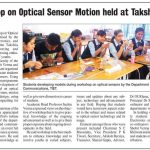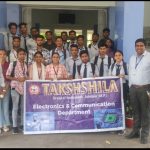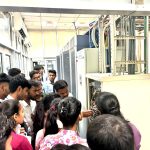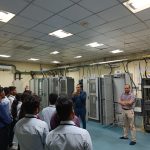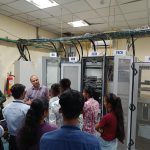The Department of Electronics & Communication Engineering (ECE) at Takshshila Institute of Engineering & Technology, Jabalpur, is committed to delivering cutting-edge education and research in the field of modern electronics and communication systems. As technology advances, ECE plays a crucial role in shaping the future of telecommunications, embedded systems, automation, robotics, VLSI design, and the Internet of Things (IoT).
The B.Tech. in Electronics & Communication Engineering program is designed to provide students with a strong foundation in electronic circuits, communication technologies, and signal processing. The curriculum integrates theoretical concepts with practical training, ensuring students gain hands-on experience with industry-standard tools and software.
With rapid advancements in 5G, IoT, AI, and smart devices, the demand for skilled ECE professionals continues to grow. Our department focuses on research, industry collaborations, and practical exposure, equipping students with the necessary skills to thrive in a technology-driven world.
Through well-equipped labs, industry projects, internships, and expert faculty guidance, the program ensures that graduates emerge as competent professionals, ready to innovate and contribute to the global technology landscape.
- Course Overview
- Head of Department
- PEO
- Course Snapshot
- Course Content
- Facilities
- Career Options
- Faculty
- Activity
Course Overview
The Electronics and Communication Engineering (ECE) program is designed to equip students with a strong foundation in electronic circuits, signal processing, and advanced communication technologies. It integrates hardware and software expertise to develop next-generation systems for telecommunication, automation, embedded systems, and wireless networking.
Key Focus Areas:
🔹 Fundamentals of Electronics – Covers semiconductors, diodes, transistors, and integrated circuits essential for modern devices.
🔹 Analog & Digital Communication – Principles of modulation, encoding, and decoding for efficient data transmission.
🔹 Wireless and Optical Communication – Exploring fiber optics, satellite systems, and next-gen 5G/6G networks.
🔹 Signal Processing & AI Integration – Application of machine learning in speech, image, and data processing.
🔹 Microprocessors & Embedded Systems – Designing microcontroller-based solutions for automation, IoT, and robotics.
🔹 VLSI & FPGA Design – Developing high-speed digital circuits for semiconductor and chip industries.
🔹 Antenna & RF Engineering – Study of radar, microwave systems, and RF circuit design for wireless applications.
🔹 Power Electronics & Renewable Energy Systems – Understanding energy-efficient converters and smart grids.
🔹 Control Systems & Robotics – Automation, feedback systems, and AI-driven robotic applications.
The ECE curriculum blends theoretical knowledge with hands-on practical training, ensuring students are well-prepared for industry demands. It emphasizes problem-solving, innovation, and interdisciplinary applications, enabling graduates to contribute to advancements in telecommunications, IoT, AI, and semiconductor technologies.
 Head of Department – Prof. Mohit Khilwani
Head of Department – Prof. Mohit Khilwani
B.E. (EC), M.Tech (Embedded System & VLSI Design) | Work Experience: 12+ Years
Prof. Mohit Khilwani, an accomplished academician and dedicated educator, brings 12+ years of experience in Electronics & Communication Engineering, contributing significantly to the growth and development of both students and the institution. With a Master’s degree in Embedded Systems & VLSI Design and a Bachelor’s in Electronics & Communication Engineering, his expertise directly benefits students by bridging the gap between theoretical learning and real-world applications. His strong technical background helps design a curriculum that aligns with industry advancements, ensuring that students receive cutting-edge knowledge and hands-on experience.
As Head of the Department, his leadership plays a pivotal role in shaping an industry-oriented learning environment. By implementing innovative teaching methodologies, practical workshops, and research-driven projects, he ensures that students gain relevant technical and analytical skills. Organizing industrial visits, expert lectures, and internships, he actively fosters collaborations with industry leaders, opening new career pathways for students and enhancing the institution’s reputation.
His expertise in IoT, PCB Designing, Proteus & EasyEDA Simulation equips students with essential practical skills required in emerging technologies. Beyond technical knowledge, his strong leadership, communication, and mentoring skills create an engaging academic culture, ensuring student success and faculty development. Through initiatives like counseling, documentation processes, and academic support, he contributes to student well-being and professional preparedness.
His contributions extend to the broader academic community, delivering guest lectures, evaluating national-level competitions like the Smart India Hackathon, and actively participating in faculty development programs. These efforts not only enhance institutional credibility but also bring valuable exposure and learning opportunities for students.
With a vision to build a dynamic, innovation-driven, and industry-ready department, he is committed to preparing students for future technological challenges while strengthening the institution’s standing in the academic and professional world. His dedication to academic excellence, research, and industry collaboration continues to drive the growth and success of both the students and the institution.
Program Educational Objectives (PEO)
The Program Educational Objectives (PEO) of the B.Tech. in Electronics & Communication Engineering are designed to:
- Build Technical Expertise – Graduates will gain in-depth knowledge of electronic circuits, signal processing, and wireless communication to excel in core and interdisciplinary fields.
- Industry Readiness – Students will develop analytical, problem-solving, and research skills, making them industry-ready professionals.
- Innovation & Entrepreneurship – The program fosters creativity and entrepreneurial mindset, encouraging students to develop startup ideas, patents, and innovative projects.
- Professionalism & Ethics – Graduates will demonstrate strong leadership, teamwork, and ethical values, contributing to society responsibly.
- Lifelong Learning – The curriculum instills a continuous learning attitude, preparing students for higher education, research, and certifications in emerging technologies.
- Industry Ready – To provide students with a “hands-on” approach to electronics & communication engineering, so that graduates process the required needs under the realistic constraints.
Course Snapshot
The Department of Electronics and Communication Engineering follows the curriculum prescribed by Rajiv Gandhi Proudyogiki Vishwavidyalaya (RGPV) .
- Duration: 4 Years (8 Semesters)
- Eligibility: 10+2 with PCM (Physics, Chemistry, Mathematics)
- Degree Awarded: B.Tech. in Electronics & Communication Engineering
- Key Focus Areas: VLSI, Embedded Systems, IoT, 5G, Signal Processing
- Industry Exposure: Internships, Projects, Certifications
- Software & Tools: MATLAB, PSPICE, VHDL, Python, IoT Platforms .etc
Course Content
The Department of Electronics and Communication Engineering follows the curriculum prescribed by Rajiv Gandhi Proudyogiki Vishwavidyalaya (RGPV) while continuously striving to go beyond the university syllabus to incorporate emerging technologies and industry trends.
To enhance academic flexibility, a wide range of elective subjects is offered, allowing students to tailor their learning experience based on their interests and career aspirations. In laboratory courses, students are encouraged to conduct value-added experiments that extend beyond the prescribed syllabus, fostering innovation and hands-on learning.
In the final year B.Tech project, students work under the guidance of experienced faculty members, with an emphasis on industry and R&D interfaced live projects. The department actively promotes collaboration with industries and research organizations, enabling students to gain real-world exposure.
Additionally, students are encouraged to contribute to academia by publishing research papers and articles in reputed journals, conferences, and workshops, enhancing their research aptitude and technical expertise. The department remains committed to providing a comprehensive learning experience that aligns with cutting-edge technological advancements.
The curriculum is designed to cover core, applied, and advanced topics in Electronics & Communication Engineering. Key subjects include:
- Basic Electronics & Circuits
- Digital Electronics & Microcontrollers
- Communication Systems (Analog & Digital)
- VLSI Design & Fabrication
- Embedded Systems & IoT
- Signal & Image Processing
- Wireless & Optical Fiber Communication
- AI & Machine Learning Applications in ECE
Students undertake lab experiments, industry projects, and research-based studies to enhance their technical expertise.
Facilities
The department is equipped with state-of-the-art laboratories and modern equipment to support research and practical learning. Facilities include:
- Advanced Electronics Lab
- Microprocessors & Microcontrollers Lab
- VLSI Design & Embedded Systems Lab
- Digital Communication Lab
- IoT & AI Research Lab
- Simulation & Software Labs (MATLAB, PSPICE, Xilinx)
Students have access to high-tech research facilities, industry collaboration projects, and innovation labs to support their academic growth.
Career Options
Graduates of Electronics and Communication Engineering have diverse career opportunities in both the private and government sectors. The field offers lucrative prospects in core electronics industries, telecommunications, IT, and research organizations.
- Private Sector Opportunities:
- Semiconductor Industry (Intel, Qualcomm, NVIDIA, Texas Instruments)
- Telecommunications (Jio, Airtel, Nokia, Ericsson)
- IT & Software Development (TCS, Infosys, Wipro)
- Embedded Systems & IoT Development
- Automotive Electronics (Bosch, Tata Motors, Mahindra Electric)
- Consumer Electronics & Robotics
- Government Sector Opportunities:
- Public Sector Undertakings (BEL, BHEL, ISRO, DRDO)
- Indian Engineering Services (IES)
- Bharat Sanchar Nigam Limited (BSNL)
- Defence Research and Development Organisation (DRDO)
- Railways, Power Grid, and State Electricity Boards
With a strong emphasis on research, innovation, and industry collaboration, the Department of Electronics and Communication Engineering strives to prepare students for successful careers and contribute to technological advancements globally.
Faculty
The department has a team of highly qualified and experienced faculty members specializing in core and interdisciplinary areas of Electronics & Communication Engineering. Faculty members are actively involved in research, industry projects, and mentorship programs, ensuring that students receive the best guidance and technical training.
Regular workshops, seminars, and guest lectures by industry experts provide students with insights into the latest advancements in technology.
Activity
The department actively organizes:
Technical Workshops & Training Programs
Hackathons & Coding Competitions
Industry Visits & Internship Programs
Research & Innovation Challenges
Startup Incubation & Entrepreneurial Support
These activities ensure that students develop practical knowledge, leadership skills, and industry connections, making them future-ready professionals in Electronics & Communication Engineering.


